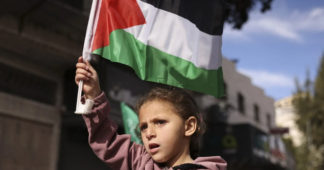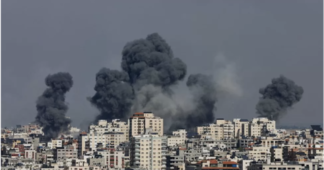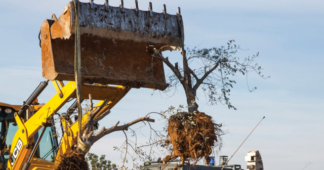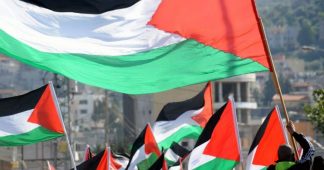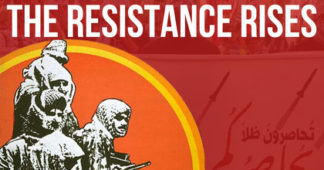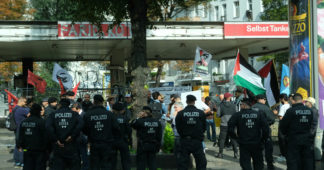By Marwan Emil Tubasi (*)
April 2, 2025
A few days ago, I read a story sent to me by my brother Ghassan, who is passionate about novels and humanistic literature. It was written by Fyodor Dostoevsky in 1849 on the wall of his prison cell while he was sentenced to death under Tsarist Russia before the revolution. This short story showcased the genius of this great novelist’s humanistic thought. Through the dialogue between the devil and the priest, Dostoevsky revealed how “hell” is not merely a threat in the afterlife but a daily reality experienced by the poor and the oppressed on earth. This story carries deep reflections on the reality of our peoples today, particularly the Palestinian reality, where the people of the region live various forms of “earthly hell.”
In our Arab East—renamed the “Middle East” to facilitate the integration of the Israeli colonial settlement into it—millions suffer from poverty, hunger, oppression, discrimination, and wars imposed by authoritarian regimes. These regimes, motivated by their leaders’ personal interests, reinforce the power of a single ruler and lack both the political will and moral integrity to confront colonial occupation, which continues to expand in our region with the support of an unjust international order aimed at enforcing what they call the “New Middle East.”
Just as Dostoevsky pointed out the suffering of oppressed workers and peasants, we find in our region entire peoples enduring oppression under regimes that exploit religion or nationalist slogans to justify their tyranny.
The international community, with its colonialist Western powers, acts like the overseer carrying a whip in Dostoevsky’s story—either supporting these regimes or contributing to the perpetuation of injustice through various forms of dictatorship, colonialism, war, and occupation. Refugees, the displaced, and the oppressed of today are akin to those Dostoevsky described in dark prison cells, factories, and farms—living under dire conditions with no hope for a better future.
In Palestine, “earthly hell” is realized in its most extreme form. The Israeli occupation exacerbates Palestinian suffering through settlement expansion, forced displacement, annexation, daily repression and killings, blockades, and ethnic cleansing. Palestinians in Gaza experience this earthly hell daily due to the unprecedented war crimes committed by the occupation, rendering their land uninhabitable and depriving them of the basic necessities of life. Meanwhile, tens of thousands of Palestinians in the West Bank are being forcibly displaced from their homes, and across historic Palestine, Palestinians endure systematic repression, home demolitions, settler violence, racial discrimination, and apartheid policies. Even Palestinian refugees in the diaspora—those forcibly displaced since the Nakba—face a fate no less severe than the characters in Dostoevsky’s prison, enduring the curse of forced exile.
On the other hand, within the Palestinian national movement, we are increasingly lacking a clear, unified, and comprehensive political vision to dismantle the occupation’s projects, which are designed to be perpetual and prevent the arrival of better days after a prolonged earthly hell. Instead, we see the exploitation of religion, empty political slogans, and the futile pursuit of deceptive American promises—whether economic or security-based—without taking tangible political steps toward achieving freedom, justice, and dignity within our inalienable rights.
Dostoevsky’s story carries a clear message: true hell is not in the distant future or the afterlife, but in the earthly injustice suffered here and now. What our Arab peoples—and Palestinians in particular—need is not more threats of earthly hell or promises of hope in the afterlife, but policies that restore human freedom and dignity on this earth—now, not tomorrow, as Fairuz once sang.
In Palestine, this requires rebuilding and clarifying the contemporary Palestinian national project by strengthening unity and national partnership, focusing on rational and effective political resistance strategies that restore the meaning of democratic national liberation. This approach must preserve the people’s resilience as a form of resistance and work towards ending the occupation first and achieving justice and human dignity—without one faction wishing for the defeat of another, regardless of internal disagreements. This also necessitates a critical review of past experiences, including the post-Oslo phase, to understand how we arrived at our current situation.
As for the broader Arab East, the solution begins with democratic systems that respect human rights, move away from sectarian and ethnic divisions, and reject imposed regimes that rule without elections or consolidate power under the pretense of “false religious claims” or “legal doctrines” that justify the status quo. We need more than just democratic elections; we require a true culture of citizenship and popular resistance that is conscious and rational—one that challenges efforts to suppress awareness or spread a culture of defeatism.
Dostoevsky’s story is not mere literary fiction but a reflection of lived reality. The people of the Arab East, especially in Palestine, suffer from the hell of American hegemony, the brutality of Zionist expansionism and racism, the absence of a unified Arab project, and the persistence of political and social fragmentation, all of which deepen our people’s suffering. This is compounded by a lack of accountability, soaring living costs, unemployment, and the failure to protect our people—even the very existence of the Palestinian Authority, once believed to be our path to statehood, is now in question. All this unfolds amid rapid changes openly declared by Israeli leaders to the world, leaving no room for the credibility of the two-state solution, which has been abandoned in favor of the “Greater Israel” project.
Real change requires confronting this hell with genuine commitment and courageous positions that prioritize the public good and independent national decision-making. It necessitates policies that establish social justice, democracy, participation, and dignity—leading to true freedom and national independence, rather than the exploitation of religion or the rhetorical battles over victory and defeat that only serve to deepen our oppression through passivity and waiting.
Change demands the embodiment of a free homeland for a free people, as the late leader Yasser Arafat often emphasized, while also embracing the principles of the Palestinian Declaration of Independence—that the people are the source of authority, that religion is for God, and the homeland is for all, as Saad Zaghloul once proclaimed. Moreover, it requires the awareness that a culture of resistance, if it equates the killer and the killed, collapses into nihilism—leading to the victory of the killer, as the martyr thinker Hassan Hamdan, known as Mahdi Amel, once wrote.
(*) Former Ambassador of Palestine to Greece
We remind our readers that publication of articles on our site does not mean that we agree with what is written. Our policy is to publish anything which we consider of interest, so as to assist our readers in forming their opinions. Sometimes we even publish articles with which we totally disagree, since we believe it is important for our readers to be informed on as wide a spectrum of views as possible.
